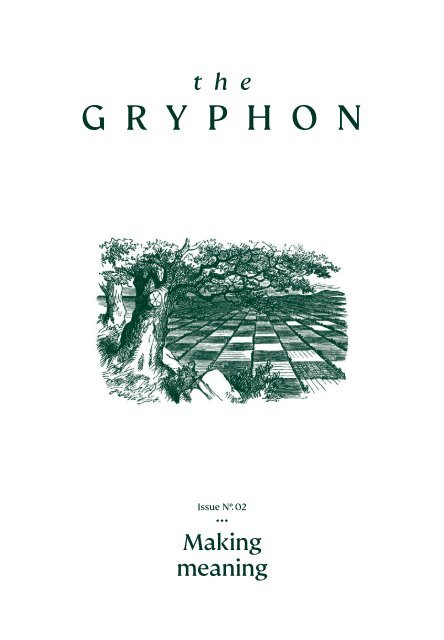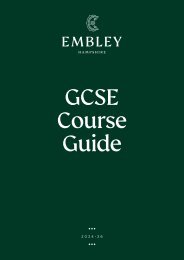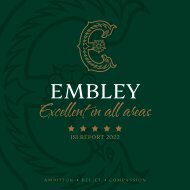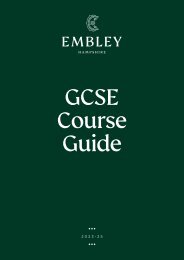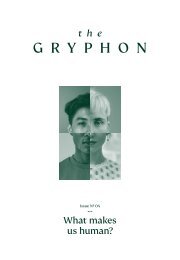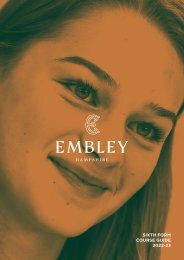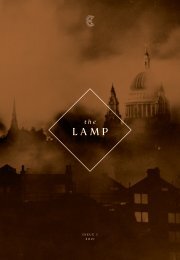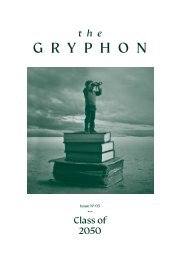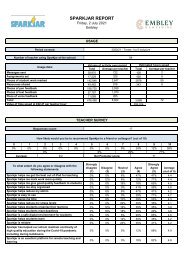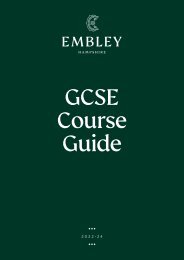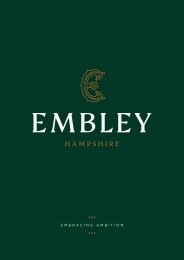the Gryphon - Issue 2
Create successful ePaper yourself
Turn your PDF publications into a flip-book with our unique Google optimized e-Paper software.
t h e<br />
G R Y P H O N<br />
<strong>Issue</strong> N o 02<br />
Making<br />
meaning
‘WOULD YOU<br />
TELL ME PLEASE<br />
WHICH WAY I<br />
OUGHT TO GO<br />
FROM HERE?’<br />
12
Welcome<br />
<strong>Issue</strong> N o 02<br />
SPRING 2021<br />
Welcome to <strong>the</strong> Spring edition<br />
of our termly chapbook, <strong>the</strong><br />
<strong>Gryphon</strong>. We hope you enjoy<br />
musing over this selection<br />
of short essays penned<br />
by our staff and students<br />
about educational topics<br />
that inspire <strong>the</strong>m.<br />
2<br />
THE MAP IS NOT THE<br />
TERRITORY<br />
Charting paths and journeys to<br />
uncover meaning, place and time.<br />
4<br />
At Embley every child is unique<br />
and deserves <strong>the</strong> recognition<br />
of that as <strong>the</strong>y grow. We help<br />
<strong>the</strong>m achieve <strong>the</strong>ir ambitions,<br />
encourage belief in oneself while<br />
being mindful that <strong>the</strong> greatest<br />
happiness is achieved by being<br />
compassionate to o<strong>the</strong>rs.<br />
MAPPING THE WAVES<br />
A tracking device for beyond<br />
our sailing fleet.<br />
6<br />
CLOSING THE VOCABULARY GAP<br />
Words, punctuation and paragraphs;<br />
a fascination for language.<br />
Embley Park, Romsey,<br />
Hampshire SO51 6ZE<br />
Main switchboard:<br />
+44 (0) 1794 512206<br />
Email: info@embley.org.uk<br />
www.embley.org.uk<br />
8<br />
CAPABLE AND WHOLE<br />
Using coaching to better<br />
understand ourselves.<br />
10<br />
WELL ON THE WAY T O<br />
INEXISTENCE, AS TO<br />
ZERO THE INFINITE<br />
The power of Beckett.<br />
Carbon balanced print is produced by a carbon<br />
balanced printer on carbon balanced paper.<br />
This edition of <strong>the</strong> <strong>Gryphon</strong>:<br />
73kg of carbon balanced & 51m 2 of land protected.<br />
12<br />
STATE OF MIND<br />
Flags, statues and meaning.<br />
1
The map<br />
is not <strong>the</strong><br />
territory<br />
BY CLIFF CANNING,<br />
HEADMASTER<br />
You will know <strong>the</strong> story of a<br />
traveller in Kerry who stopped to ask<br />
a local for directions; having mused<br />
for a moment on <strong>the</strong> question <strong>the</strong><br />
traveller was told: “Well if I was you,<br />
I wouldn’t start from here.”<br />
The tourist and Alice are both lost but<br />
perhaps <strong>the</strong> wisdom of <strong>the</strong> local echoes<br />
some ideas shared by <strong>the</strong> grinning cat<br />
with Alice:<br />
“Would you tell me please which way I ought<br />
to go from here?<br />
That depends a good deal on where you want<br />
to get to.”<br />
It seems that both our protagonists are<br />
looking for direction, <strong>the</strong> direction usually<br />
afforded by a map, but this creates a concern.<br />
The cartographic representation shares with<br />
us nothing of <strong>the</strong> travails of travel.<br />
The map is not <strong>the</strong> territory. A straightforward<br />
enough proposition you might think and<br />
perhaps banal? But I wonder? Korzybski had<br />
an appreciation of a subtlety that imbues<br />
this <strong>Gryphon</strong> and takes forward Alice’s<br />
curiosity from issue one. The looking glass<br />
becomes curiouser <strong>the</strong> more we gaze into it.<br />
This <strong>Gryphon</strong> explores <strong>the</strong> relationship<br />
between what we write or draw, effectively<br />
<strong>the</strong> signs we make (<strong>the</strong> scratching and<br />
scribbling) with <strong>the</strong> sense we make of <strong>the</strong>m.<br />
You reader are busily decoding <strong>the</strong> letters or<br />
symbols I write; luckily for you type makes my<br />
scratching intelligible if not comprehensible.<br />
The arrangement of letters into words makes<br />
thought intelligible. There is a school of<br />
thinking that suggests this link is so profound<br />
that one cannot think a thought for which<br />
<strong>the</strong>re is no word. We might come back to this<br />
later or not at all.<br />
If we consider <strong>the</strong> development of vocabulary,<br />
<strong>the</strong> more words children have <strong>the</strong> more<br />
thoughts <strong>the</strong>y can entertain. In a real<br />
sense <strong>the</strong>ir horizons expand and <strong>the</strong>ir<br />
consciousness develops. They have <strong>the</strong> facility<br />
to play with ideas and concepts that may<br />
well be unthinkable to <strong>the</strong>m without this<br />
language - or at least allows <strong>the</strong>m to encode<br />
2
t h e<br />
G R Y P H O N<br />
<strong>the</strong>ir thinking such that o<strong>the</strong>rs may make<br />
sense of it. If words function as vehicles for<br />
thinking <strong>the</strong>n <strong>the</strong> more robust and expansive<br />
our vocabulary <strong>the</strong> more that is thinkable<br />
and <strong>the</strong>refore knowable to us as humans.<br />
Language development allows children <strong>the</strong><br />
most effective vehicle not only to map <strong>the</strong><br />
territory of what is thinkable but to actually<br />
cross it in real time.<br />
Just as you will read later, Jack’s tracking<br />
project allows us to plot and navigate. It is<br />
not a representation of <strong>the</strong> experience of <strong>the</strong><br />
Solent chop nor of <strong>the</strong> biting wind, it is an<br />
approximation of place and time, <strong>the</strong> map is<br />
not <strong>the</strong> territory. This is surely something he<br />
has in common with Beckett?<br />
The artificial territory of <strong>the</strong> stage suggests<br />
an aperture through which we can examine,<br />
explore and develop what it means to be<br />
human. Books may be a mighty bloodless<br />
substitute for life, but <strong>the</strong>y provide a space<br />
wherein life might be considered, priorities<br />
set out and ideas tested if not for veracity,<br />
<strong>the</strong>n au<strong>the</strong>nticity. In “zeroing <strong>the</strong> infinite”<br />
by emptying <strong>the</strong> stage and reducing (or<br />
enriching depending on your perspective)<br />
performance to an interplay of words and<br />
character, is he not refining <strong>the</strong> map? Is he<br />
not replicating <strong>the</strong> essentials? Stripped of<br />
cultural context, of <strong>the</strong> baggage of place and<br />
<strong>the</strong> burden of historical influence or bias, he<br />
is extemporising <strong>the</strong> essence of our condition.<br />
The heavy and weary weight of historical<br />
significance has recently been played out<br />
through <strong>the</strong> very public display of antipathy<br />
toward <strong>the</strong> monuments and iconography of<br />
<strong>the</strong> past. Serious and compelling questions<br />
are to be raised about our flag waving and <strong>the</strong><br />
true colour of what this level of representation<br />
means for today. No one can look on without<br />
interest as statues in <strong>the</strong> American south and<br />
along Bristol’s quays are deconstructed. The<br />
significance <strong>the</strong>y celebrate is now rejected.<br />
“Out out brief candle…” Macbeth ruminates<br />
on <strong>the</strong> frailty we are all heir to. Faulkner<br />
picked up on <strong>the</strong> “...sound and fury” in his<br />
retelling of <strong>the</strong> demise of an American family.<br />
All things pass, this too will pass. There are<br />
two ideas here. The transience of misfortune<br />
should allow us to hold very gently <strong>the</strong><br />
travails of this day, but so too must it caution<br />
us against <strong>the</strong> arrogant possession of success<br />
or contingent truths held not for <strong>the</strong>ir own<br />
sake but that of contemporary convenience:<br />
all things pass. You might be forgiven for<br />
<strong>the</strong>n asking what is it that remains? If all our<br />
yesterdays have lighted fools <strong>the</strong> way to dusty<br />
death, is Shakespeare right? Is life:<br />
“a tale<br />
Told by an idiot, full of sound and fury,<br />
Signifying nothing.”<br />
The reality is that no one finds <strong>the</strong> answer for<br />
everyone. The interplay between individuals<br />
and <strong>the</strong> questioning that characterises<br />
<strong>the</strong> most effective coaching allows us <strong>the</strong><br />
opportunity to make sense of our own<br />
experience and to set our own goals. What do<br />
<strong>the</strong> signs and symbols that we build our lives<br />
around really signify? In <strong>the</strong> juxtaposition<br />
of language and meaning, in its surrealism,<br />
Alice challenges us to be au<strong>the</strong>ntic, to see <strong>the</strong><br />
relationship between <strong>the</strong> world and things<br />
and <strong>the</strong>reby to be <strong>the</strong> best version of ourselves.<br />
So where do we want to get to? If <strong>the</strong><br />
destination is a life well-lived, <strong>the</strong> cat is<br />
right and wrong at <strong>the</strong> same time (apologies<br />
to Schrödinger): it may not matter which<br />
way you go, but how you cover <strong>the</strong> ground<br />
does matter and matters most. Regardless<br />
of our GPS, whatever tracking device we<br />
determine, <strong>the</strong> map is still not <strong>the</strong> territory,<br />
but it and <strong>the</strong>y offer direction, points on <strong>the</strong><br />
compass, cartographic landmarks. They don’t<br />
describe <strong>the</strong> nature of <strong>the</strong> journey, only <strong>the</strong><br />
individual traveller experiences that. The<br />
destination is defined and in fact conditioned<br />
by how we travel, <strong>the</strong> signs and symbols are<br />
only meaningful representations when our<br />
destination is embodied in our journey. There<br />
is no map for that territory.<br />
E: headmaster@embley.org.uk<br />
3
MAPPING<br />
THE WAVES<br />
Captain of Sailing at Embley and<br />
Sixth Form student, Jack, explains why<br />
he’s developing a tracking device for <strong>the</strong><br />
school’s sailing boats for his EPQ.<br />
4
t h e<br />
G R Y P H O N<br />
The Extended Project Qualification (EPQ)<br />
is a qualification that Sixth Form students<br />
can choose to take in addition to A Levels,<br />
usually just for one year, making it equivalent<br />
to half an A Level. You work on an independent<br />
project unrelated to your o<strong>the</strong>r studies, that<br />
can be in <strong>the</strong> form of a design, performance,<br />
report, dissertation or artefact. Currently, I am<br />
four months into my project and have chosen<br />
to do <strong>the</strong> latter, an artefact.<br />
The basis of my project is to research how<br />
boats can be tracked, to analyse and evaluate<br />
different trackers, and <strong>the</strong>n install<br />
<strong>the</strong> tracker that best suits<br />
our needs on one of our<br />
keelboats which can<br />
display live data on <strong>the</strong><br />
school website. The<br />
project came about<br />
from my passion for<br />
keelboat sailing, which<br />
Embley introduced me<br />
to a couple of years<br />
ago. Having started<br />
on Thursday afternoons<br />
during my Games sessions<br />
just for fun, I’ve now moved on to<br />
<strong>the</strong> keelboat race team, competing in <strong>the</strong> 2019<br />
Round <strong>the</strong> Island Race and have recently taken<br />
on <strong>the</strong> role of Captain of Sailing at Embley. I<br />
also love programming, so why not combine<br />
<strong>the</strong> two for my EPQ?<br />
But why install a tracker on one of our keelboats<br />
- what’s <strong>the</strong> point? I believe <strong>the</strong>re are many<br />
benefits to this, not only to <strong>the</strong> keelboat race<br />
team but to <strong>the</strong> wider school and community.<br />
It’s undeniable how useful a GPS tracker,<br />
plotting to a map, can be to analyse <strong>the</strong><br />
performance of a sail. Let’s say we were sailing<br />
King George, one of our Etchell 22s, from<br />
Embley’s base at Lymington to Cowes on <strong>the</strong><br />
Isle of Wight at high water. This isn’t ideal as<br />
<strong>the</strong> tide is flowing at almost two knots against<br />
us out of <strong>the</strong> Solent. If we were cruising at six<br />
knots through water, that’s only four knots<br />
over ground, due to <strong>the</strong> tidal streams flowing<br />
against us. A journey that would normally take<br />
two to three hours has instead taken three to<br />
four hours. We can compare our route recorded<br />
by <strong>the</strong> GPS tracker to tidal stream maps that<br />
allow us to see where water is flowing and at<br />
what speed at any given time. From this, we<br />
can opt to hug <strong>the</strong> nor<strong>the</strong>rn coast of <strong>the</strong> Isle<br />
of Wight, as <strong>the</strong>re is very little tidal flow<br />
<strong>the</strong>re, if we were to sail from<br />
Lymington to Cowes at high<br />
water again.<br />
It’s not just students<br />
in <strong>the</strong> keelboat race<br />
team who can benefit<br />
from this. Parents of<br />
students who sail on<br />
<strong>the</strong> school’s keelboats<br />
can track where <strong>the</strong>ir<br />
children are in real-time<br />
whilst <strong>the</strong>y are out on <strong>the</strong><br />
water. It also offers an insight<br />
into how seriously we take keelboat<br />
sailing at Embley, and hopefully will attract<br />
current students who haven’t tried keelboat<br />
sailing before to give it a go! The installation<br />
of a GPS tracker and <strong>the</strong> subsequent inclusion<br />
on <strong>the</strong> school website helps to make parents<br />
of young sailors feel more included in <strong>the</strong><br />
keelboat sailing programme and makes it<br />
seem like a more worthwhile programme to be<br />
involved with.<br />
So, when <strong>the</strong> next keelboat sailing season<br />
comes round, take a look at <strong>the</strong> live tracker on<br />
<strong>the</strong> school website (not available yet) whenever<br />
your child is enjoying <strong>the</strong>ir time aboard one of<br />
our keelboats, out on <strong>the</strong> water!<br />
5
Closing<br />
<strong>the</strong><br />
vocabulary<br />
gap<br />
Language excites me.<br />
Semi colons are powerful.<br />
Paragraphs create drama.<br />
The world of reading<br />
and writing is one which<br />
I have been fascinated<br />
by from a young age,<br />
explains Sheina Wright,<br />
Head of Prep.
t h e<br />
G R Y P H O N<br />
From refusing to get out of <strong>the</strong> car, when<br />
I was reaching <strong>the</strong> end of The Twits, to<br />
excitedly scribbling notes about <strong>the</strong> symbolism<br />
of wea<strong>the</strong>r in my copy of Wu<strong>the</strong>ring Heights.<br />
Books and reading make me happy.<br />
My dad adores books and passed that love on<br />
to me. Vocabulary, <strong>the</strong>refore, was prioritised<br />
and part of my world from a very young<br />
age at home as well as beyond <strong>the</strong> school<br />
gates. Vocabulary is learned<br />
implicitly and incidentally<br />
as well as explicitly and <strong>the</strong><br />
vocabulary gap can appear<br />
from a young age. Unless<br />
addressed it begins to widen,<br />
and in turn, so does <strong>the</strong><br />
attainment gap.<br />
In ‘Closing <strong>the</strong> Vocabulary<br />
Gap’, Alex Quigley explores<br />
<strong>the</strong> challenges that <strong>the</strong><br />
vocabulary gap presents and<br />
ways to address it. His writing<br />
has underpinned some of my<br />
thoughts in this article. He<br />
asks: What is <strong>the</strong> percentage of words known<br />
in a text to ensure reading comprehension<br />
- 50% 65% 80% or 95%? It is a massive 95%, just<br />
one example of <strong>the</strong> importance of cultivating<br />
and developing vocabulary growth.<br />
Literacy is everyone’s responsibility. Being<br />
word poor can impact on a child’s learning<br />
across <strong>the</strong> curriculum, throughout school.<br />
An ability to break down questions and<br />
understand key vocabulary is a skill required<br />
in ALL subjects.<br />
Let’s use this History question as an example:<br />
A tower in <strong>the</strong> inner part of a castle where<br />
stores were usually kept and where defenders<br />
would retreat to as a last resort was called…?<br />
Literacy is<br />
everyone’s<br />
responsibility.<br />
Being word poor<br />
can impact<br />
on a child’s<br />
learning across<br />
<strong>the</strong> curriculum,<br />
throughout school.<br />
This is a literal question which requires a<br />
one word answer. However, if pupils don’t<br />
understand ‘defenders’, ‘retreat’ or ‘resort’ <strong>the</strong>n<br />
<strong>the</strong>y can’t answer <strong>the</strong> question.<br />
In Ma<strong>the</strong>matics children can come across<br />
<strong>the</strong> same issue in problem solving questions.<br />
These can be vocabulary rich multi step<br />
problems, which rely on an ability to break<br />
down a question before you’ve even begun to<br />
figure out how to apply your<br />
maths skills.<br />
So how do we improve<br />
this vocabulary deficit<br />
as teachers. Across <strong>the</strong><br />
subjects we make sure that<br />
vocabulary is ‘taught not<br />
just caught’. It is planned<br />
in and explicitly taught. We<br />
use diverse vocabulary in<br />
our talk. We value it and<br />
use a structured approach<br />
and academic language.<br />
Alongside this we encourage<br />
independent reading of<br />
quality texts, so that children can experience<br />
more sophisticated sentence structure and<br />
more complex vocabulary.<br />
The explicit teaching of vocabulary helps<br />
to offer children strategies so that <strong>the</strong>y can<br />
increasingly unlock more challenging texts<br />
and <strong>the</strong>refore gain pleasure from reading texts<br />
which will make <strong>the</strong>m word rich.<br />
So next time you are studying a subject<br />
in school or are hard at work consider <strong>the</strong><br />
language of your subject, discuss it with those<br />
around you or when you get home. Make a<br />
conscious decision to be word rich and mind<br />
that vocabulary gap.<br />
E: sheina.wright@embley.org.uk<br />
7
CAPABLE<br />
&<br />
WHOLE<br />
8
t h e<br />
G R Y P H O N<br />
Capable and whole. It is what we<br />
all want to be, isn’t it? Moreover, it<br />
is how we all want to feel. Therein<br />
lies <strong>the</strong> premise for coaching,<br />
suggests Rebecca Thomas-Snell,<br />
Director of Sixth Form.<br />
Despite what every American rom-com<br />
may try to have us believe, no one<br />
knows you better than you know yourself.<br />
We humans are funny beasts and every day<br />
collect feelings and views like tiny trinkets<br />
that we <strong>the</strong>n surround ourselves with. If<br />
we were to explore this through cognitive<br />
science, we may delve into <strong>the</strong> world of<br />
emotional schema with <strong>the</strong> ‘slot-filler<br />
structures’ (Seel, 2012) exploring why and<br />
how we form our opinions on people and<br />
events. However, coaching diverges from this<br />
fixed mindset and it centres on working out<br />
who you are: what is fundamental to <strong>the</strong> root<br />
of you? Where do your values lie? What does<br />
successful look like? And, ultimately, what<br />
shape does happiness take for you?<br />
We are adaptable and able to change (though<br />
<strong>the</strong>se would have made less catchy lyrics for<br />
Gloria Gayner and Shirley Bassey). Coaching<br />
holds a mirror up to what we do well and<br />
what we need to be more open to. Being<br />
actively cognisant of our strengths and<br />
weaknesses can help us to stretch ourselves<br />
and better understand our situational<br />
behaviour. Simultaneously, it can help us<br />
to understand who we are beyond o<strong>the</strong>r<br />
people’s perceptions.<br />
The equation related to coaching is<br />
Event + Behaviour = Result. Rarely can we<br />
control all aspects of an event, but we can<br />
control our behaviour; <strong>the</strong>refore, we do have<br />
control over <strong>the</strong> outcome. Of course, <strong>the</strong>re<br />
will be situations which are challenging,<br />
upsetting, or even downright unfair; but if<br />
we are able to use this equation, we can stop<br />
ourselves from feeling disempowered or<br />
disenfranchised.<br />
Coaching is a tricky word which can polarise<br />
groups. Some may see it as something set<br />
aside only for <strong>the</strong> sports field, or it may<br />
raise images of inspiring slogans plastered<br />
across walls that lack any form of substance.<br />
The reality is quite different: <strong>the</strong> reality<br />
empowers us to better understand ourselves<br />
and to make pragmatic, evidence-based<br />
decisions.<br />
E:rebecca.thomas-snell@embley.org.uk<br />
9<br />
3
Well on <strong>the</strong> way<br />
to inexistence,<br />
as to zero <strong>the</strong><br />
infinite<br />
Samuel Beckett is my favourite playwright,<br />
writes Elaine Morgan, Assistant Head<br />
Co-curricular and Head of Drama.<br />
10
t h e<br />
G R Y P H O N<br />
once set out to try and articulate what it is<br />
I that I love about Beckett’s plays and why <strong>the</strong>y<br />
have such a profound effect on me.<br />
Beckett explores cosmology and ontology in<br />
a unique way. He eliminates external factors,<br />
fragments <strong>the</strong> self, de-territorialises <strong>the</strong> world<br />
of his plays and pushes all <strong>the</strong> time closer to<br />
inexistence in order to explore <strong>the</strong> nature of<br />
existence.<br />
His characters and worlds are ‘well on <strong>the</strong><br />
way to inexistence’. And this is his means of<br />
knowing more: ‘as to zero <strong>the</strong> infinite’. I feel<br />
that this quote encapsulates Beckett’s creation<br />
of <strong>the</strong>atre because zero has no quantity and can<br />
be a factor that negates something, which is<br />
what Beckett does to <strong>the</strong> external influences in<br />
his plays. And this leads him to <strong>the</strong> infinite, to<br />
all <strong>the</strong> possibilities in <strong>the</strong> universe.<br />
Beckett explores and intensifies <strong>the</strong> relationship<br />
between character and spectator by creating<br />
characters that have within <strong>the</strong>m <strong>the</strong> need to<br />
be perceived in order to exist, and giving <strong>the</strong><br />
spectator <strong>the</strong> power to bestow existence upon<br />
<strong>the</strong>m, by perceiving <strong>the</strong>m, which is an idea<br />
Beckett derived from Berkeley’s philosophy, ‘to<br />
be is to be perceived’.<br />
By fragmenting <strong>the</strong> self of his characters,<br />
Beckett breaks down body and mortality,<br />
mind and voice - driving his characters towards<br />
inexistence, and through this <strong>the</strong> very essence<br />
and truth of <strong>the</strong> character prevails.<br />
Mirroring <strong>the</strong> creation of his disembodied<br />
characters, Beckett de-territorialises <strong>the</strong> worlds<br />
of his plays, thus offering more freedom to<br />
explore metaphysically <strong>the</strong> boundaries and<br />
freedoms within space and time. The thinking<br />
behind cosmology is that <strong>the</strong> world is a result<br />
of all <strong>the</strong> phenomena of space and time. In<br />
most <strong>the</strong>atrical settings, space and time are<br />
harnessed and defined in terms of a given<br />
territory - <strong>the</strong> where and <strong>the</strong> when in which<br />
it occurs. By ‘de-territorialising’ his <strong>the</strong>atrical<br />
settings, Beckett breaks down <strong>the</strong> limitations<br />
of territory and enters a place where he can<br />
explore space and time beyond <strong>the</strong>se limits and<br />
in terms of <strong>the</strong> universe ra<strong>the</strong>r than <strong>the</strong> world.<br />
Beckett’s minimalistic <strong>the</strong>atrical style is his<br />
trademark. Instead of adding to his worlds in an<br />
attempt to find out more, he reduces all that can<br />
be reduced. From Waiting for Godot onwards,<br />
he has never specified any setting for his plays<br />
and no exact location could ever be determined<br />
from <strong>the</strong> texts, due to <strong>the</strong> unspecified realms in<br />
which <strong>the</strong>y are set.<br />
Though Beckett removes <strong>the</strong> limitations of<br />
territory, in terms of space and time, <strong>the</strong>re is one<br />
element of territory that he doesn’t completely<br />
remove. This element is <strong>the</strong> sense of someone<br />
or something having a governing power within<br />
this existence.<br />
Samuel Beckett uses <strong>the</strong> medium of play<br />
writing, and <strong>the</strong> tools of <strong>the</strong> <strong>the</strong>atre in his<br />
search for metaphysical knowledge, by bringing<br />
his subjects to <strong>the</strong> brink of inexistence. And<br />
it makes his work unique, timeless and<br />
profoundly enthralling.<br />
E: elaine.morgan@embley.org.uk<br />
11
States<br />
of mind<br />
Dr Thomas Sebrell, History teacher, considers<br />
how flags and statues are no more than<br />
symbols, rooted in ideas and values.<br />
12
t h e<br />
G R Y P H O N<br />
Growing up in Virginia, I found myself<br />
surrounded by reminders of <strong>the</strong><br />
American Civil War (1861-65). This was<br />
hardly surprising, as <strong>the</strong> state served as<br />
<strong>the</strong> capital of <strong>the</strong> shortly-lived Confederate<br />
States of America and <strong>the</strong> largest <strong>the</strong>atre of<br />
<strong>the</strong> war. Additionally, it was <strong>the</strong> birthplace<br />
of <strong>the</strong> Confederacy’s most legendary<br />
generals – Robert E. Lee, ‘Stonewall’ Jackson<br />
and J.E.B. Stuart. It was impossible to drive<br />
anywhere without encountering some sort<br />
of a memorial to <strong>the</strong>m – statues, plaques,<br />
street names or school names. Most<br />
notable, and loudest, was <strong>the</strong> frequency of<br />
seeing Confederate flags flying in front of<br />
houses, at memorials, scattered throughout<br />
cemeteries, on pick-up trucks, and in<br />
state and local government buildings. In<br />
kindergarten we were taught <strong>the</strong> differences<br />
between <strong>the</strong> American and Confederate<br />
flags, as <strong>the</strong> latter was seen as often as <strong>the</strong><br />
former. This could be tricky for a five year<br />
old – both are red, white and blue, one has 13<br />
stripes, <strong>the</strong> o<strong>the</strong>r with 13 stars.<br />
Growing up as a white male, I had no<br />
negative thoughts about it. I was taught<br />
that <strong>the</strong> Civil War was fought over states’<br />
rights (individual states losing power to<br />
an aggressive, Washington-based federal<br />
government), and not <strong>the</strong> future of slavery<br />
in <strong>the</strong> United States. When you saw a<br />
Confederate symbol, you only thought of<br />
your own personal pride of being ‘American<br />
by birth, Sou<strong>the</strong>rn by <strong>the</strong> grace of God’.<br />
You were taught in school that General Lee<br />
owned no slaves, was actually anti-slavery,<br />
but made <strong>the</strong> honourable decision in<br />
refusing to fight against his home state of<br />
Virginia, and so led <strong>the</strong> Confederates on <strong>the</strong><br />
battlefield. This is what historians now call<br />
‘Old South Mythology’.<br />
With each higher level of education, it<br />
became harder to ignore <strong>the</strong> truth of this<br />
historic war – it was caused by and entirely<br />
about slavery. In high school, it was more<br />
than noticeable that black students became<br />
upset, sometimes angry, at <strong>the</strong> sight of <strong>the</strong><br />
Confederate flag. Arguments about <strong>the</strong><br />
symbol became frequent and intense.<br />
My interest in <strong>the</strong> subject saw me<br />
pursue it at both undergraduate and<br />
postgraduate levels, by which point I had<br />
lost pride in my Confederate heritage. Not<br />
all white Sou<strong>the</strong>rners had experienced<br />
transformations. Change, however, was<br />
demanded after <strong>the</strong> shooting of nine<br />
black worshippers at a Charleston, South<br />
Carolina, church by a white supremacist who<br />
frequently posted pictures of himself on<br />
Twitter holding a Confederate flag. Within<br />
weeks, <strong>the</strong> symbol of <strong>the</strong> pro-slavery flag was<br />
removed from public spaces.<br />
Although <strong>the</strong> flag became absent in public,<br />
ano<strong>the</strong>r prominent symbol was targeted –<br />
Confederate statues. After <strong>the</strong> 2020 death<br />
of George Floyd, and <strong>the</strong> sharp increase<br />
of support for <strong>the</strong> Black Lives Matter<br />
movement, protesters across <strong>the</strong> South<br />
pulled down and desecrated statues of<br />
heroes of <strong>the</strong> Old South. Most noticeably,<br />
<strong>the</strong>re was little resistance to this.<br />
Flags and statues are nothing more than<br />
symbols. They resonate loudly and are<br />
rooted in ideals and values.<br />
Clearly, <strong>the</strong> majority of Americans no longer<br />
feel that Confederate symbols represent<br />
who <strong>the</strong>y are now.<br />
Image courtesy of The Washington Post.<br />
E: thomas.sebrell@embley.org.uk<br />
13
“That depends a good<br />
deal on where you want<br />
to get to,” said <strong>the</strong> cat.<br />
“I don’t much care<br />
where,” said Alice.<br />
“Then it doesn’t matter<br />
which way you go,”<br />
said <strong>the</strong> cat.<br />
Embley Park, Romsey, Hampshire SO51 6ZE<br />
Main switchboard: +44 (0) 1794 512206<br />
Email: info@embley.org.uk<br />
www.embley.org.uk


